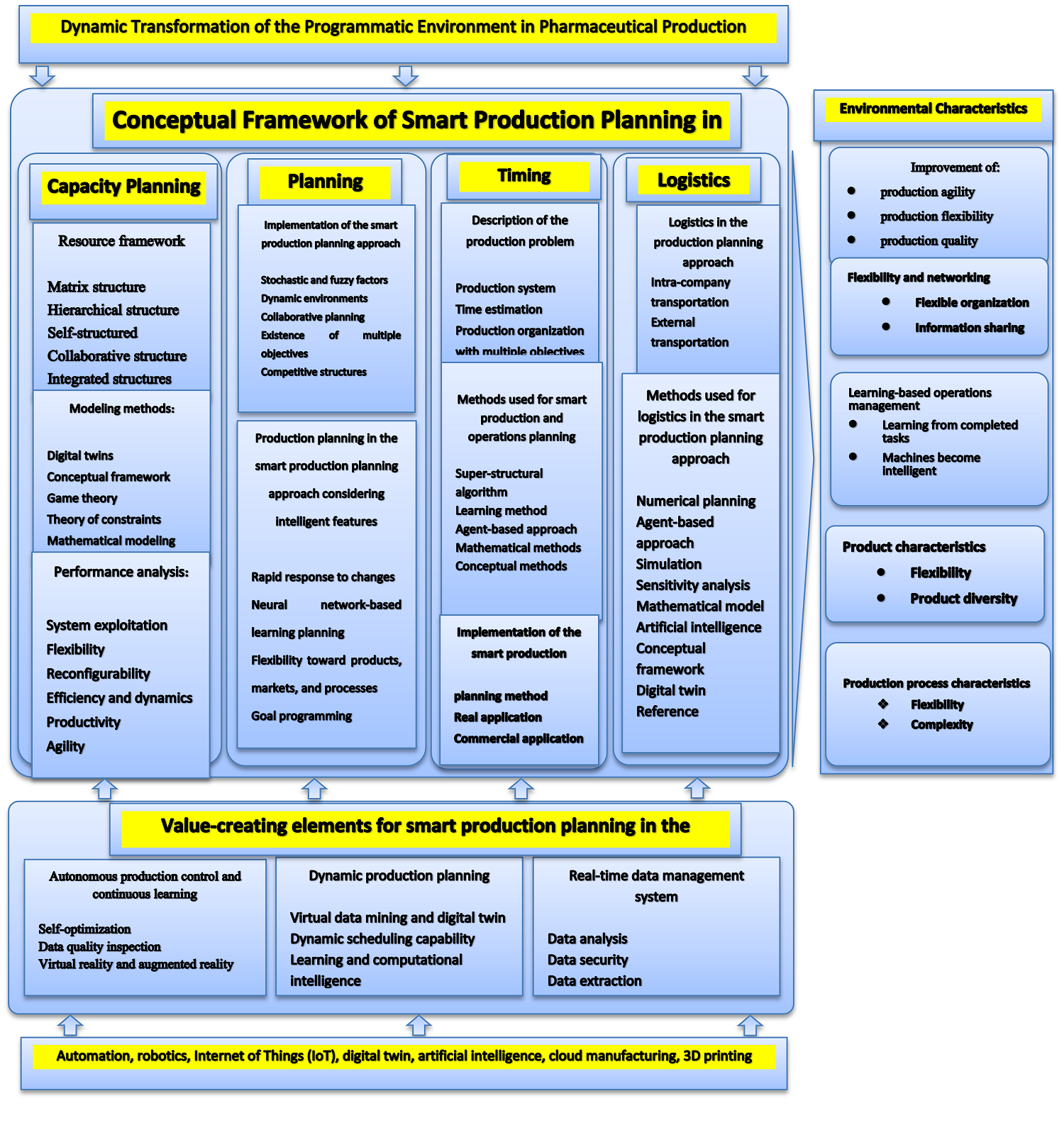Smart Production Planning: Presenting a Framework for the Importance and Application of Features of the Production Planning Environment (Case Study: Pharmaceutical Industry)
Keywords:
Smart Production Planning, Production Planning Environment, Biopharmaceutical Pharmaceutical IndustryAbstract
The purpose of this paper was to examine the importance of smart production planning for improving performance, considering the specific features of the planning environment in the pharmaceutical industry. This study uses four empirical case studies in the pharmaceutical industry. These four cases represent four companies producing different products within the pharmaceutical industry for various markets, each with distinct processes. Additionally, along with industry insights, these frameworks were used to identify, define, and structure the variables expected to have the greatest impact on the importance of smart production planning within the theoretical framework. This work was carried out through discussions within the project team and repeated multiple times. The framework was subsequently used to map and analyze the four empirical case studies in the biopharmaceutical pharmaceutical industry. The cases were selected to demonstrate different features of the planning environment and smart production planning approaches, ranging from make-to-stock (MTS) to assemble-to-order (ATO) and make-to-order (MTO). Data was collected through observations and site visits at pharmaceutical manufacturing facilities, workshops, consultations, and formal interviews with production managers, production planners, smart supply chain managers, innovation managers, and production line engineers. Internal and cross-case analyses were performed through several iterations within the pharmaceutical industry team. The fundamental finding is that the potential and importance of smart production planning for improving performance increase with the complexity of the production planning environment. As a result, nine final steps for the design and development of smart production planning importance are presented. The conceptual framework presented is based on the combination of smart production planning, the features of the production planning environment, and the elements of the Fourth Industrial Revolution. The developed framework serves two objectives. First, it provides a tool to structure and describe the planning environment in the pharmaceutical industry, considering product, market, and process features. Insights gained from such a framework regarding the planning environment's features can be useful for smart production purposes. The second contribution of the framework is linking the planning environment's features with smart production planning. The core logic is that the importance of smart production planning for improving performance increases with the intelligence and complexity of the planning environment.
References
M. Rahmani and et al., "Towards Smart Production Planning and Control: A Conceptual Framework Linking Planning Environment Characteristics with the Need for Smart Production Planning and Control," Annual Reviews in Control, 2022. [Online]. Available: https://doi.org/10.1016/j.arcontrol.2022.03.008.
A. Jahed and R. Tavakoli Moghadam, "Mathematical Modeling for Flexible Production Scheduling in a Smart Transportation System," Iranian Journal of Management Studies, 2020. [Online]. Available: https://sid.ir/paper/370622/fa.
N. Slack, S. Chambers, and R. Johnston, Operations and Process Management: Principles and Practice for Strategic Impact. Pearson Education, 2010.
H. Cañas and et al., "A Conceptual Framework for Smart Production Planning and Control in Industry 4.0," Computers & Industrial Engineering, 2022. [Online]. Available: https://doi.org/10.1016/j.cie.2022.108659.
J. C. Bendul and H. Blunck, "The Design Space of Production Planning and Control for Industry 4.0," Computers in Industry, vol. 105, pp. 260-272, 2019, doi: https://doi.org/10.1016/j.compind.2018.10.002.
A. F. Bueno, M. Godinho Filho, and A. G. Frank, "Smart Production Planning and Control in the Industry 4.0 Context: A Systematic Literature Review," Computers & Industrial Engineering, p. 106774, 2020, doi: https://doi.org/10.1016/j.cie.2020.106774.
M. Bresler, A. Romsdal, J. O. Strandhagen, and O. E. Oluyisola, "Principles and Research Agenda for Sustainable, Data-Driven Food Production Planning and Control," in Advances in Production Management Systems. The Path to Digital Transformation and Innovation of Production Management Systems, 2020: Springer, Cham, doi: https://doi.org/10.1007/978-3-030-57993-7_72.
E. Colangelo, C. Fries, T. F. Hinrichsen, Á. Szaller, and G. A. Nick, "Maturity Model for AI in Smart Production Planning and Control System," PROCEDIA CIRP, vol. 107, pp. 493-498, 2022. [Online]. Available: https://doi.org/10.1016/j.procir.2022.05.014.
O. E. Oluyisola, "Towards Smart Production Planning and Control," Norwegian University of Science and Technology (NTNU), Trondheim, 2021.
O. E. Oluyisola, S. Bhalla, and F. Sgarbossa, "Designing and Developing Smart Production Planning and Control Systems in the Industry 4.0 Era: A Methodology and Case Study," Journal of Intelligent Manufacturing, vol. 33, pp. 311-332, 2022, doi: https://doi.org/10.1007/s10845-021-01808-w.
O. E. Oluyisola, F. Sgarbossa, and J. O. Strandhagen, "Smart Production Planning and Control: Concept, Use-Cases and Sustainability Implications," Sustainability, vol. 12, no. 9, p. 3791, 2020. [Online]. Available: https://doi.org/10.3390/su12093791.
F. Salahi, A. Daneshvar, M. Homayounfar, and A. Pourghader Chobar, "Presenting an Integrated Model for Production Planning and Preventive Maintenance Scheduling Considering Uncertainty of Parameters and Disruption of Facilities," Journal of Industrial Management Perspective, vol. 13, no. 1, pp. 105-140, 2023, doi: 10.48308/jimp.13.1.105.
N. Bagherirad and J. Behnamian, "Solving Multi-Factory Intelligent Network Scheduling Problem in Job Shop Production Environment Using Improved Lagrangian Relaxation Algorithm," Journal of Industrial Engineering Research in Production Systems, vol. 11, no. 22, pp. 31-43, 2023, doi: 10.22084/ier.2023.27578.2121.
A. Kusiak, "Smart Manufacturing Must Embrace Big Data," Nature, vol. 544, no. 7648, pp. 23-25, 2017.
R. Bean and T. H. Davenport, "Companies are Failing in Their Efforts to Become Data-Driven," Harvard Business Review, 2019.
A. Romsdal, "Differentiated Production Planning and Control in Food Supply Chains," NTNU, Trondheim, 2014.
M. Sharifzadegan, M. Heidari, K. Pouri, A. Pourghader Choubar, and M. Abolghasemian, "Presenting a Mathematical Model for Production Scheduling and Maintenance Considering Resource Accessibility Constraints in Uncertainty Conditions," 2023. [Online]. Available: https://civilica.com/doc/1900949. [Online]. Available: https://civilica.com/doc/1900949
M. Dannapfel, T. Wissing, R. Förstmann, and P. Burggräf, "Human Machine Cooperation in Smart Production: Evaluation of the Organizational Readiness," International Journal of Mechanical Engineering and Robotics Research, vol. 8, no. 2, pp. 327-332, 2019, doi: 10.18178/ijmerr.8.2.327-332.
J. O. Strandhagen, H. C. Dreyer, and A. Romsdal, Control Model for Intelligent and Demand-Driven Supply Chains Managing Global Supply Chain Relationships: Operations, Strategies and Practices. IGI Global, 2011.












